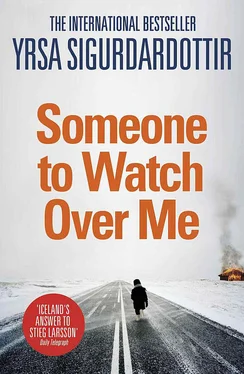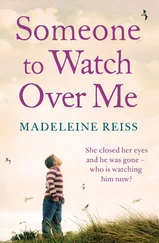After this the conversation went much better. The man’s anger diminished and he appeared to realize slowly but surely that Thóra’s intentions were good. She carefully formulated her questions so that it would be impossible to interpret them as being in any way negative towards Friðleifur. ‘So he didn’t hang around with anyone undesirable? Someone who might possibly have attacked him at work, and things might have escalated from there?’
‘No, I don’t think so. His friends were like him, easy-going, laid-back guys. Of course I wished he’d been a bit keener on the books, but I don’t know whether that had anything to do with his friends; they were all the same, and most of them dropped out of high school. Actually, I think Friðleifur was planning to go back to school. It’s just a hunch, but when I could finally bring myself to go through his room, I found a brochure of evening classes and some textbooks on pharmacology that he’d apparently bought. God knows he had enough time to study on the night shift.’
‘He lived at home, in other words?’
‘Yes – he didn’t exactly make a fortune from that job, or from his previous jobs, so he couldn’t afford payments on an apartment, and we weren’t in much of a position to help out either. It’s an incredible relief not to be stuck with an unsellable apartment on which you owe more than what you paid for it. Still, he was doing pretty well before he died; he’d become more sensible with his finances.’
Thóra’s mobile beeped, and she read the short text message as she spoke. It was from Sóley, asking whether she was coming home. ‘I don’t imagine you and your wife ever visited the home, though I understand your daughter sometimes dropped in there?’ She replied to Sóley as she waited for the man’s reaction: Soon.
‘Did she? I didn’t know that. Why do you mention it? If she visited him, I don’t see how it’d be relevant here; he and his sister got on well, that’s all.’
‘I was just wondering whether she could maybe assist me. An outsider might have a clearer perspective and I can’t see a statement from her anywhere in the case files.’
‘No, there wasn’t one; and as I say, I wasn’t aware she’d visited him there. Are you sure?’
The phone beeped again. ‘Well, I don’t see why my source would have made it up, or indeed how he would have known that Friðleifur had a sister at all. I’m certainly not suggesting that anything untoward took place, but I’d still be interested to speak to her.’ Thóra reached for her mobile to see the new message. Sóley still had to learn how to end these exchanges; every reply was always followed by another. Thóra had recently gone through it with her, but it didn’t seem to have had any effect.
‘I’d like to discuss it with her first. You don’t think I’d let you loose on her without asking her?’
‘No, no. Absolutely not.’ She prodded the phone’s keypad to see what her daughter had to say. On the screen she read 02 short hose , which meant nothing to her, but underneath it was a photo. ‘Perhaps I could just get in touch with you again in a few days, or you could call me, and by then you might…’ Thóra lost the thread of the conversation. The picture on the little screen was a long way from the kind of thing Sóley usually sent. It was a black, charred corpse leaning back in the remains of an office chair. The deformed head hung over the back of the seat as if the individual had been waiting to have his throat cut; his hands hung at his sides, black palms facing forward. She’d seen this image before. It was Friðleifur.
‘Are you still there?’ The man sounded concerned.
‘What? Oh, yes. I’m sorry.’ Thóra pressed the button to display the phone number and saw that the message was, of course, not from Sóley. ‘Did you just send me a text message?’
He sounded surprised now. ‘I wouldn’t know how to – I’m not good enough with phones to be able to send a message during a conversation. Why do you ask?’
‘Sorry, I just got a bit confused.’ Thóra found it difficult to concentrate on speaking to Guðjón with the image on the screen filling her mind. Who had sent it, and why? She hurried to wind up the conversation. ‘Will you speak to your daughter, then, and let me know? The sooner the better.’ The man agreed he would and said goodbye. Who knew if he’s keep his promise? As soon as he hung up she turned back to the message on her phone. She was in such a rush that it felt like she had ten thumbs and she was afraid she’d deleted the message in her clumsiness. Luckily she hadn’t. She checked the phone number from which the message had been sent, but now it appeared to have been sent from the phone company Telecom. After a rather lengthy call to the company, during which she was transferred twice to different departments, she was informed that it had probably come from the free SMS service that they offered on the Internet. When Thóra reported that she’d also received three strange messages from ja.is, the man on the line sighed and told her that the best thing would be for her to request that such messages be blocked from reaching her phone. It was very easy and could even be done online. When Thóra said that she wasn’t keen on the idea, the man sighed again; clearly this wasn’t the first time the messaging service had been misused, and he must be tired of having these conversations. When Thóra explained to him that her enquiry had to do with a court case, the man’s tone changed and he told her that all messages sent from the Internet were actually registered and traceable, but that it took time to trace them. He pledged to look into it as soon as he could, but couldn’t promise he’d find anything. He took down her mobile number and the time of the message, which he said was enough information, and they hung up.
Thóra took a closer look at the photo. It wasn’t very clear on the little screen but she recognized the subject nevertheless. A similar photo had been included in the police records found in one of Ari’s files, but not in the documents Jakob’s mother had given her. The photo was one of several taken at the scene before the bodies of the dead were removed. They had all caused Thóra’s hair to stand on end and each and every one of them had imprinted itself so strongly onto her mind that she didn’t need to see them clearly in order to recognize them again. She called Matthew.
‘How can I enlarge a photo that I received in a text message?’
‘Oh, hi, Matthew. How are you, Matthew?’
‘You’ll get a hi later, when I come home. I seriously need to find out how I can view a photo from my mobile in an ordinary size. Do you know how?’
‘Umm…’ Matthew clearly didn’t relish admitting that this was beyond his knowledge, even though he was rather more technologically minded than Thóra. ‘I don’t know how you would do it on your phone but it must be possible to find out.’
‘So you know how to do it on your phone?’ Perhaps Thóra could forward the message to him.
‘Umm…’ Matthew sucked his teeth. ‘No, not exactly.’ Before Thóra could say anything he added hastily: ‘If you still have the cables that came with it, you should be able to upload the photo to your computer. If you’ve lost them, I’m sure Gylfi could help you with it.’
‘Do we know anyone who keeps those cables somewhere they can actually remember?’ As soon as she said this she remembered that they did: Matthew himself. She added hurriedly: ‘Anyway, see you in ten minutes.’
Before Thóra left her office she looked up photos of the scene in order to confirm to herself that the little photo was of Friðleifur’s body. Luckily it was among the first that she pulled out, so she was spared from having to trawl through the entire mess once more. It was quite clear that the subject of the photo was the same, and in fact it looked like exactly the same photo. Who the hell had access to the police photograph database, and why had they sent it to her?
Читать дальше












